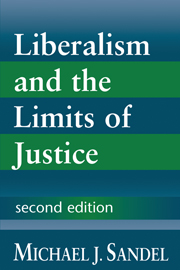Book contents
- Frontmatter
- Contents
- Preface to the Second Edition: The Limits of Communitarianism
- Acknowledgments
- Introduction: Liberalism and the Primacy of Justice
- 1 Justice and the Moral Subject
- 2 Possession, Desert, and Distributive Justice
- 3 Contract Theory and Justification
- 4 Justice and the Good
- Conclusion: Liberalism and the Limits of Justice
- A Response to Rawls' Political Liberalism
- Bibliography
- Index
Introduction: Liberalism and the Primacy of Justice
Published online by Cambridge University Press: 05 June 2012
- Frontmatter
- Contents
- Preface to the Second Edition: The Limits of Communitarianism
- Acknowledgments
- Introduction: Liberalism and the Primacy of Justice
- 1 Justice and the Moral Subject
- 2 Possession, Desert, and Distributive Justice
- 3 Contract Theory and Justification
- 4 Justice and the Good
- Conclusion: Liberalism and the Limits of Justice
- A Response to Rawls' Political Liberalism
- Bibliography
- Index
Summary
This is an essay about liberalism. The liberalism with which I am concerned is a version of liberalism prominent in the moral and legal and political philosophy of the day: a liberalism in which the notions of justice, fairness, and individual rights play a central role, and which is indebted to Kant for much of its philosophical foundation. As an ethic that asserts the priority of the right over the good, and is typically defined in opposition to utilitarian conceptions, the liberalism I have in mind might best be described as ‘deontological liberalism’, a formidable name for what I think will appear a familiar doctrine.
‘Deontological liberalism’ is above all a theory about justice, and in particular about the primacy of justice among moral and political ideals. Its core thesis can be stated as follows: society, being composed of a plurality of persons, each with his own aims, interests, and conceptions of the good, is best arranged when it is governed by principles that do not themselves presuppose any particular conception of the good; what justifies these regulative principles above all is not that they maximize the social welfare or otherwise promote the good, but rather that they conform to the concept of right, a moral category given prior to the good and independent of it.
This is the liberalism of Kant and of much contemporary moral and political philosophy, and it is this liberalism that I propose to challenge.
- Type
- Chapter
- Information
- Liberalism and the Limits of Justice , pp. 1 - 14Publisher: Cambridge University PressPrint publication year: 1998
- 1
- Cited by



